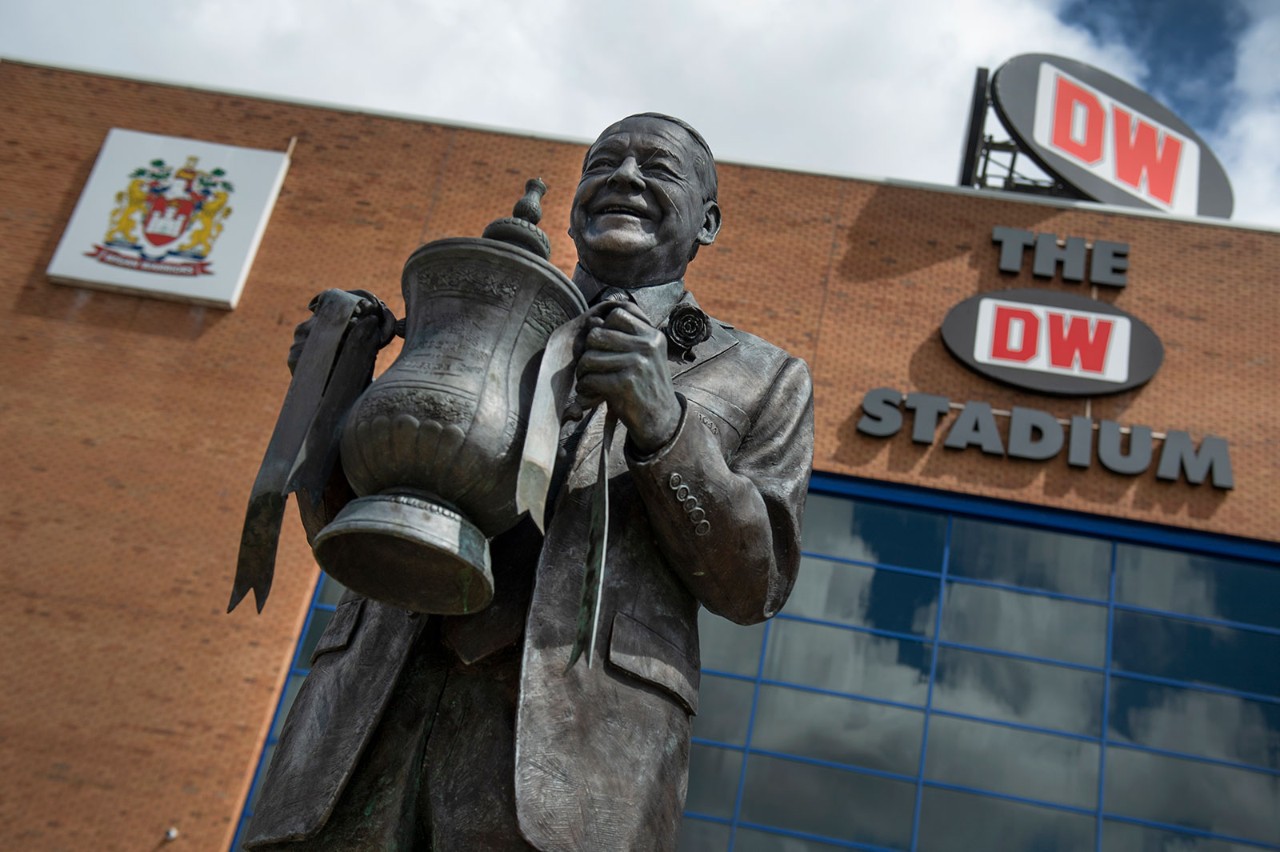
The average football fan’s all-consuming hunger for trophies is matched only by their head-shaking contempt when the owners of the club they support don’t make the enormous player investments needed to satisfy that craving.
For fans of Wigan Athletic FC, relegated at the end of last season from the Championship, English football’s second tier, the dichotomy is a particularly painful one.
Immediately after buying the club, its new owners put it into administration. The move incurred a mandatory 12-point deduction. It was enough to relegate Wigan Athletic to Football League One, the third tier of English football. Without that deduction the club would have finished respectably mid-table, as it won five out of its nine final games, and be playing again for the chance of promotion to the land of milk and honey that is the Premier League.
‘Wigan have been let down by those who appear to have seen it as an opportunity for investment and profit’
Given the disastrous consequences of that change of ownership for the club – which faces a further 15-point League One penalty if it cannot clear its debts – the process and the financials have come under close scrutiny. A panel of barristers that heard the club’s unsuccessful appeal against its 12-point deduction concluded: ‘Wigan have been let down by those who appear to have seen it as an opportunity for investment and profit.’
So how did it all go so wrong?
The deal
In June 2020, the then club owner Stanley Choi, who controls Hong Kong-listed hotel and casino operator International Entertainment Corporation (IEC), sold Wigan for £40m, including debt, which was nearly twice what he had paid for the club 18 months previously.
The buyer was Next Leader Fund (NLF), a Hong Kong-based company controlled by Choi, who is also a high-stakes poker player, with Au Yeung Wai Kay, another Hong Kong businessman, the minority shareholder. Back in July, Choi told the Financial Times that prior to the deal he had had no relationship with Kay.
Prior to the June 2020 sale, the club owed £25.3m and £10.7m respectively to NLF and Wigan Athletic Holdings, a company owned by Kay, who then bought out Choi’s NLF shareholding in June.
Kay’s decision to put the club into administration within days of taking it over seems a less obviously attractive option than putting in enough money to play the season’s final post-lockdown games to finish off the Championship campaign and then selling assets (which included the stadium, a training ground and several highly sought players) in the summer to balance the books.
Kay spoke to insolvency firm Begbies Traynor about the possibility of administration (as well as several other options) on 23 June, one day before informing the English Football League he had bought a 51% stake in the club.
The move to place the club into administration came on the same day that the club was told the English Football League would advance it a £2.325m solidarity payment. That payment was never made because Wigan Athletic went into administration on the same day. Kay has stated that the financial situation brought on by the Covid-19 pandemic was responsible for Wigan going into administration.
Expert view
Kieran Maguire, Liverpool University lecturer in football finance and author of The Price of Football, says: ‘When IEC acquired Wigan in November 2018 – they’re a casino and hotel operator in the Philippines, with no track record in running of a football club – a few red lights started flashing. Commenting on the decision to go into administration in June, he adds: ‘It is hard to justify the owners’ actions from a business perspective.’
A report on the Hong Kong Stock Exchange from IEC, when seeking a sale, suggested they valued the club at £17.5m. Maguire says for the new owners to ‘abandon’ the club after making such an investment seems very strange. ‘Why would they simply write off that amount, approximately £36m in total? How could that be in their interest?
‘The sad part is that this appears to be a private agreement between two individuals. None of this mess had anything to do with the club, but they and the fans are the ones to suffer.’
Tragedy
The independent arbitration panel of three senior barristers that heard Wigan Athletic’s appeal against the 12-point deduction for entering administration described the situation as a ‘tragedy’. They added in their report: ‘Our attention was drawn to a suggestion that the whole process of putting the club into administration might have been in relation to the gambling interests of Au Yeung Wai Kay and/or Dr Choi.
‘Given the way in which international betting markets operate, we recognise that this is not impossible, but it is wholly unsubstantiated as an explanation for what happened here. Accordingly, we discount the suggestion on the evidence we have.’
The panel upheld the points deduction, while its report confirms that although Kay had the cash to keep the club in business, his other interests took priority over the fate of the club.
Not another penny
The barristers’ report explains: ‘Kay made it clear in an interview with joint administrator Gerald Krasner of Begbies Traynor, that, although he had money available, his other business took priority, and so it was not available to Wigan (he had previously made it clear through his solicitors that he was not going to put in ‘another penny’). ‘Mr Krasner told us that Mr Kay showed no interest in pursuing what he called the “solvent option”.’
The joint administrators (Krasner, Paul Stanley and Dean Watson) said they ‘found nothing to substantiate any allegations’ against Kay.
After persuading Kay to waive his entitlement to the repayment of the two loans, the joint administrators estimate that between £7.5m and £10m is required to buy and fund the club over the next 18 months.
Outstanding debts
The club still owes money to football creditors and a further £1.3m to other creditors (HMRC accounts for more than half), along with bills for losses while in administration. By the end of September, these debts will amount to a combined £3m.
The club will also have to pay its own running costs, legal bills and the costs of the EFL. That figure stands at just over £2m.
If those bills are not met, the club risks incurring a 15-point penalty in League One. That represents a potentially disastrous handicap as it attempts to stabilise its affairs without suffering a further relegation to League Two, the final tier of English professional football before the regionalised pyramid of semi-professional and amateur teams below.
The new owner will also have to find a new training centre, as the administrators have sold off the club’s Euxton training centre to football rival Preston North End.
As for success on the field, with Wigan Athletic beaten in its opening League One fixture, the glory of the Latics’ FA Cup final victory in 2013 – against Manchester City, no less, whose subsequent trophy trajectory has been a very different story – seems a distant memory.
Timeline
1932
Wigan Athletic formed
1978
Club promoted to the Football League
2004
Club promoted to English football’s top flight
2013
Club wins FA Cup and is relegated to the Championship in the same season
November 2018
IEC buys Wigan Athletic for £15.9m
4 June 2020
Club announces that its sale by IEC to NLF for £17.5m plus repayment of £24m loan has formally completed
24 June 2020
Au Yeung Wai Kay becomes NFL majority shareholder and approaches Begbies Traynor as potential administrators
1 July 2020
Club placed into administration, automatically triggering a 12-point deduction
22 July 2020
Club finishes Championship campaign with five wins and one loss in its nine post-lockdown matches
4 August 2020
Club loses appeal against points deduction and is relegated





